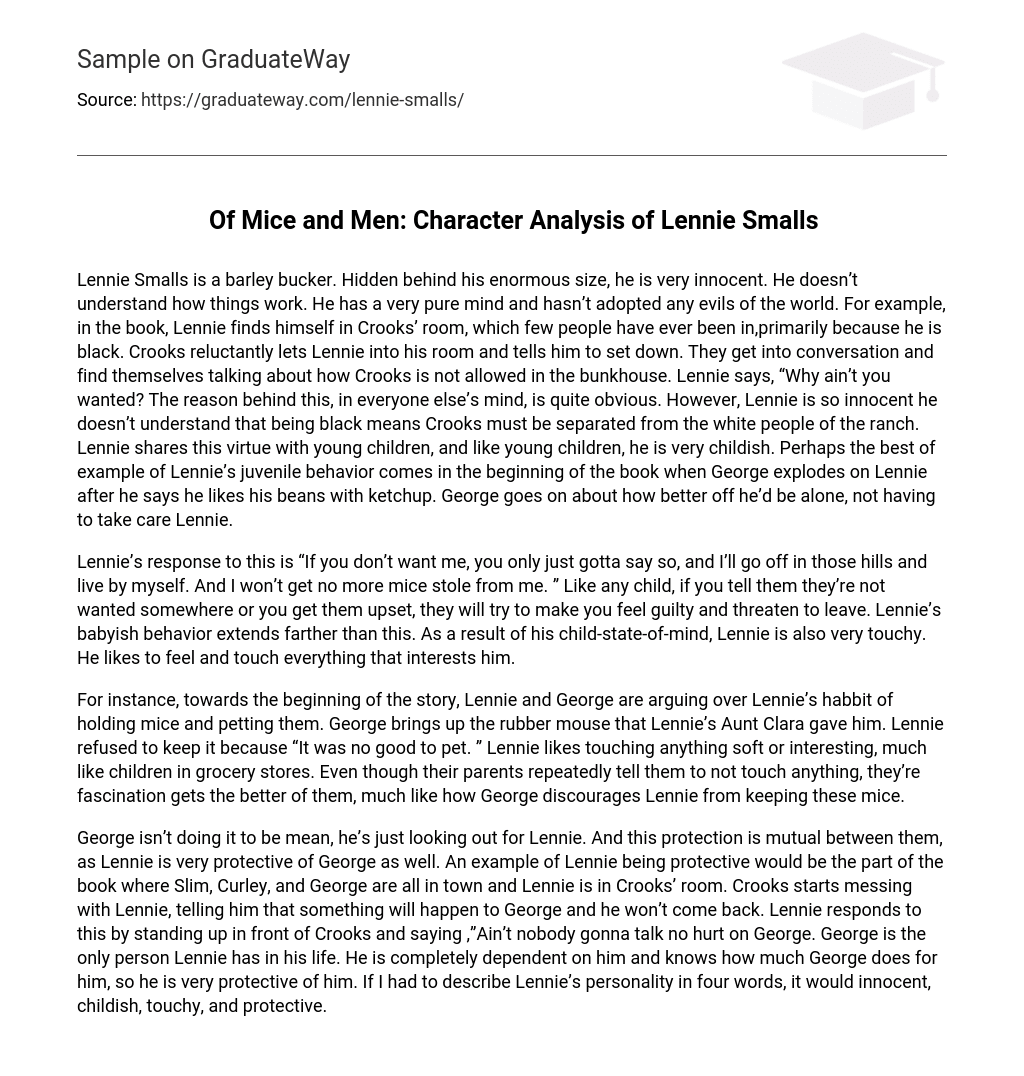Lennie Smalls is a barley bucker, but despite his enormous size, he is incredibly innocent and lacks an understanding of how the world works. His mind remains pure and unaffected by the evils of society. In John Steinbeck’s book, Lennie finds himself in Crooks’ room, a place that not many people have access to, primarily due to Crooks’ race. Despite some reluctance, Crooks allows Lennie to enter his room and they engage in conversation, discussing the fact that Crooks is not allowed in the bunkhouse. Lennie’s innocence shines through when he questions why Crooks is unwanted, oblivious to the racial discrimination that separates him from the white ranchers. Lennie’s childlike nature mirrors that of young children who possess the same virtue. One notable example of Lennie’s childish behavior occurs at the start of the book when George gets angry at him for expressing his preference for beans with ketchup. George expresses his frustration and contemplates how much easier it would be for him to be alone without the responsibility of taking care of Lennie.
Lennie expresses his response by saying, “If you don’t want me, you only just gotta say so, and I’ll go off in those hills and live by myself. And I won’t get no more mice stole from me.” Similar to a child, if you make them feel unwanted or upset, they may attempt to make you feel guilty and threaten to leave. Lennie’s infantile behavior goes beyond this. Because he has a childlike mindset, Lennie is also highly sensitive. He enjoys exploring and touching anything that grabs his attention.
At the start of the story, Lennie and George argue about Lennie’s habit of holding and petting mice. George mentions the rubber mouse given to Lennie by his Aunt Clara, which Lennie refuses to keep because “It was no good to pet.” Lennie, like children in grocery stores, enjoys touching anything soft or interesting despite being told not to by their parents. Similarly, George discourages Lennie from keeping these mice due to his fascination with them.
George and Lennie have a mutual protective bond. For instance, when Crooks tries to taunt Lennie by suggesting something bad might happen to George, Lennie quickly defends his friend. Lennie deeply relies on George, who is the only person in his life, and understands George’s importance. Therefore, Lennie’s nature can be described as innocent, childish, touchy, and protective. Due to his limited cognitive ability, Lennie doesn’t engage with others much on the ranch and often talks about irrelevant topics during conversations.
When Lennie is in Crooks’ room, Crooks shares the depth of his childhood memories and reminisces about growing up on his father’s chicken ranch. In response, Lennie quickly shifts his focus to ask about when the puppies will be old enough for petting. This incident demonstrates Lennie’s limited attention span. Despite his intellectual limitations, Lennie possesses a genuinely kind nature, which contrasts with his physical stature. He never engages in conflicts with anyone on the ranch, choosing not to employ his immense strength and size to overpower others even when faced with confrontation.
Curley attacks Lennie, who does nothing to defend himself, despite his ability to overpower Curley. Instead, Lennie shields his face and calls out for George’s assistance, showing his desperation to avoid the confrontation. Eventually, George advises Lennie to retaliate, leading him to grab hold of Curley’s hand and crush it until it breaks. This recurring pattern of incidents in the novel highlights Lennie’s immense strength, which ultimately contributes to his downfall.
Before his untimely death, Lennie Smalls had a strong longing to care for rabbits, which he mentioned repeatedly in his stories. Regardless of the topic of conversation, Lennie’s mind was consumed by thoughts of rabbits. His desire to tend rabbits stemmed from his innocent and childlike nature and also reflected his self-perception. In the world, Lennie’s greatest aspiration wasn’t to amass wealth or own land; rather, it was solely to tend to rabbits, cherishing the opportunity to touch and look after them. Similar to his dream, Lennie possessed a very childlike disposition. Currently, however, Lennie is unable to fulfill his wish of taking care of rabbits.
On the ranch, he and George are bucking barley for a monthly salary of $50. While George looks forward to the money, Lennie couldn’t care less about it. The money holds no significance to him. Additionally, he dislikes their current location, finding it to be “mean”, and the hard labor he engages in every day fails to bring him any joy. Lennie is unhappy and won’t find happiness until he can work on a farm taking care of rabbits. Although readers of Of Mice and Men easily grasp Lennie Smalls’ character early on, the residents of the ranch struggle to comprehend him.
Lennie’s lack of speech makes it hard for others to recognize his mental slowness. When looking at Lennie, it is not apparent that talking is the only way his mental handicap can be perceived. Therefore, unless someone has had a personal conversation with him, they will only see this aspect of his personality due to his quiet nature. Ultimately, I believe that Lennie’s mental slowness is the most overlooked among his various traits.





